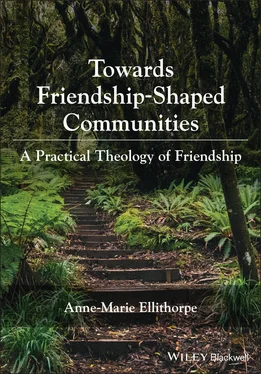As a parent, teacher, pastor, and theologian I consider friendship important for all parents, teachers, pastors, and theologians to pay attention to and to cultivate. I have come to recognize friendship as an important formative relationship that, along with being a source of joy and delight, nurtures skills for living in community with others and provides an analogy for citizenship.
Building on this revived interest in friendship, and with a strong conviction of its significance and potential, I seek to develop a practical theology of friendship that draws on contemporary, Indigenous, biblical, classical, patristic, and medieval sources in identifying practices and understandings that contribute to personal and civic dimensions of friendship. A practical theology of friendship has the potential to shape the social and theological imagination in positive and constructive ways, thus contributing to authentic friendship in contemporary communities.
Theology has never been a solely academic pursuit. Rather, it has always involved “the work of the people ” turning to, responding to, and even arguing with God in various contexts for diverse purposes. 13 Recognizing theology as an embodied practice, practical theology in its broadest sense seeks to facilitate the goal of living faithfully in the present “on behalf of God’s future.” 14
Practical theology also refers to a method of understanding or analyzing theology in practice and to a curricular area in theological education. Finally, practical theology refers to an academic discipline pursued by scholars to sustain and support the first three understandings. 15 These four facets, identified by practical theologian Bonnie Miller-McLemore, are of course interdependent, as exemplified by this research. My research takes place within the academic discipline of practical theology, makes use of practical theology methodology, and seeks to contribute to the lived expression of faith in the present and on behalf of God’s future, in and through authentic friendship.
The term practical theology has been used interchangeably with pastoral theology. Practical theology is generally understood to have a broader focus, which includes matters of importance both in and beyond the church. The scope of this field includes shaping social transformation and public policy, along with other aspects of the church’s engagement with the world. 16 Pastoral theology, with its focus on care, is best seen as a valued sub-discipline of practical theology. The embrace of a broader paradigm of practical theology does not diminish concern for personal and communal spirituality.
Ultimately, practical theology is both normatively and eschatologically oriented. 17 As well as describing how people live within communities and society, practical theology considers how people may do so “more fully.” 18 Moreover, practical theology seeks to reintegrate theology into “the weave and fabric” of life, in such a way that theology becomes a way of life. 19 Practical theology is a theological theory of action that emerged as a theory of crisis, contributing to restoration and renewal. 20 It considers the reciprocal relationship between theology and everyday life, including how everyday life influences theology and how knowledge of love and love for the divine shape everyday life. The wider aim of practical theology is to “enrich the life of faith for the sake of the world.” 21 This research seeks to reflect these understandings of practical theology, as it advocates for the fostering of holistic private-public friendships that contribute to restoration, renewal, and reform.
Practical Wisdom, Practices, and the Social Imagination
Practical theology draws on the academic turn to practical philosophy and the importance of phronesis (practical wisdom), based on the conviction that critical reflection about the goals of human actions is both possible and necessary. The rebirth of practical philosophy is designed to demonstrate this conviction, to question the dominance of the more theoretical forms of reason, and to secure a stronger place for practical reason within the academy. 22 While practical theology may draw on Aristotelian philosophy, it must not be limited by exclusive Aristotelian understandings of the greater good, but rather be enriched by the compassionate, redemptive, and liberating themes of biblical, Black, and Indigenous phronesis. 23
Hans-Georg Gadamer depicts a strong relationship between understanding and phronesis . 24 The application of knowledge and wisdom is a primary concern in both hermeneutical conversation and moral judgment. Understanding may be construed as a “moral conversation” with a text or historic witness that is shaped by practical concerns emerging from current situations. 25 Understanding and practical wisdom are intertwined; they interpenetrate and overlap. One way in which this focus on practical wisdom is evident within this research is in the focus on practices.
The concept of practices provides a way of thinking about the close relationship between thinking and doing. However, scholars from various academic backgrounds use the word practice in diverse ways. For some, any socially meaningful action such as sharing an idea is a practice. For others, only complex social activities, such as playing chess, practicing medicine, or pursuing politics, are practices.
Within the social sciences, practice refers to any socially meaningful action. 26 Etienne Wenger, an educational theorist, defines practice as action or doing “that gives structure and meaning to what we do” within specific historical and social contexts. 27 This concept of practice includes that which is implicit and unspoken as well as that which is explicit and spoken. Wenger asserts that the process of engaging in practice always involves the whole person. His use of practice integrates practical and theoretical, ideal and reality, talking and doing. From this perspective, each friendship can be viewed as a community of practice. Friendships are typically formed within broader communities of practice, including educational, workplace, religious, and special interest communities. Pursuing friendship, as with other relationships and enterprises, includes an active, embodied, social, negotiated, and at times somewhat delicate process of participation. This use of practice includes the small yet significant actions that contribute towards friendship, such as welcoming, listening, storytelling, and confiding, as well as more complex activities, including discerning, forgiving, and receiving and offering hospitality.
Moral philosopher Alasdair MacIntyre uses the term social practice to refer to “complex social activities that pursue certain goods internal to the practices” themselves. 28 By his definition, friendship itself is a social practice, with the goals of authentic friendship being internal to friendship. Yet, as not all actions are considered practices, other activities contributing to friendship are regarded as practices only if there are goals or aims that can be accomplished only by engaging in that form of activity. A person is not regarded as an authentic practitioner if they “instrumentalize” a practice for some other external end. 29 To be a practitioner of chess, for example, is to seek those “goods” that are specific to the game, including analytic skill, strategic imagination, and the joy of competition. If one’s key goal in playing chess is to become famous, then one has instrumentalized this practice, as such a goal can be pursued by other means. 30
MacIntyre’s influence is reflected in the understanding of Christian practices developed by Dorothy Bass and Craig Dykstra. These writers define Christian practices as “things Christian people do together over time to address fundamental human needs in response to and in the light of God’s active presence for the life of the world.” 31 Their approach presumes that these practices take place within a world sustained by God. 32 The emphasis on receptivity and responsiveness to others through practices is in keeping with the nature of friendship. On the other hand, it is recognized that any given practice can be in disrepair and thus become distorted, even destructive. 33 Such deformity can become evident within so-called friendships.
Читать дальше












